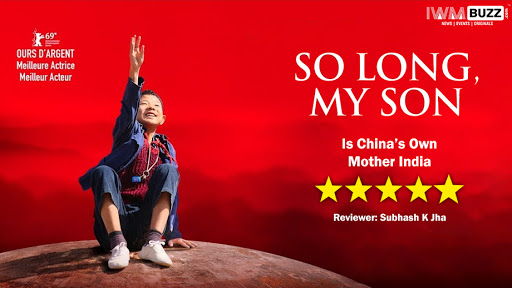Starring Wang Jingchun (as Liu Yaojun),Yong Mei (as Wang Liyun)
Directed by Wang Xiaoshuai
Rating: *****(5 stars)
This 3-hour long Chinese epic is a staggering achievement in every sense. After I finished watching it I sat in supreme silence thinking about life, mortality, continuity, lineage, marital harmony, friendship and at the end of it all, the futility of it all.
How do I describe So, Long My Friend? At its most visible level, it is the story of a couple, played with self-effacing velocity by Wang Jingchun and Yong Mei, who lose their only son in a freak drowning accident. The narration, done up in moving images culled from the past and tossed into the present, shows us in vivid yet unobtrusive colours of grief, how this tragedy determines the couple’s entire journey of life.
“Now we are just waiting for old age,” the father of the drowned son tells his best friend and his friend’s wife who hold themselves guilty for the tragedy as their own son Shen Hao was with the doomed boy on the fateful day that changed the narrative of two couple’s lives.
So Long, My Son is so much like life. It is as complicated or simple as you make it. You can watch the film in its gracefully unfolding cinematic saga of pain, tragedy, heartbreak and reconciliation. Or you can dig deeper into the troughs of Chinese history of the past 50-60 years when single-child families were made mandatory by the Chinese government.
What happens during such a dictatorial regime when a couple loses their child and cannot try for another? The grief of the protagonists is like silent whiplashes in the film. I felt their pain for the entire three hours of the film, as two of the most non-actorial actors I’ve ever seen in any language played out the distressing destiny of a couple who lose their entire life in one accident.
Director Wang Xiaoshuai never makes it easy for us to suffer with the grieving couple. As time passes, their bereavement too evolves into a powerful beast that takes many forms, from a failed adoption attempt, to an extra-marital affair. In fact the only time I was not invested into the story was when the grieving father has an affair which ends in an unwanted pregnancy for the woman who offers, with piquant generosity, to give the child to the grieving childless couple.
Luckily for the narrative,Yong Mei doesn’t play the kind of wife who would accept such a weird offer from her husband’s paramour. It’s amazing how little the actress playing the grieving mother speaks. In three hours Yong Mei utters maybe ten small sentences. The Chinese know how to respect silences.When would we ever learn?
There are episodes of almost unbearable poignancy in the narrative where, I am not ashamed to day, I sobbed openly. Most heartbreaking is the grief of the mother of the boy who survives in the drowning tragedy.Three decades after the tragedy, her surviving son now a doctor, on her deathbed she tells the mother of the dead son, “I’ve got the money for you to hide your second child from the authorities.”
Reminding the couple in her dementia of the unborn child that they aborted because their government wouldn’t allow them to have a second child. But my question is, would another offspring’s presence have helped Liu Yaojun and Wang Liyun to cope better with the death of their son? Does he tragedy of bereavement diminish in the presence of another child?
There are so many unanswered questions in So Long, My Son. A film so steeped in the colours of meditative melancholy that no words of praise seem adequate. Perhaps a two-minute silence in honour of this unconditional masterpiece is the best review for a film about the wages of death and the finality of loss.


